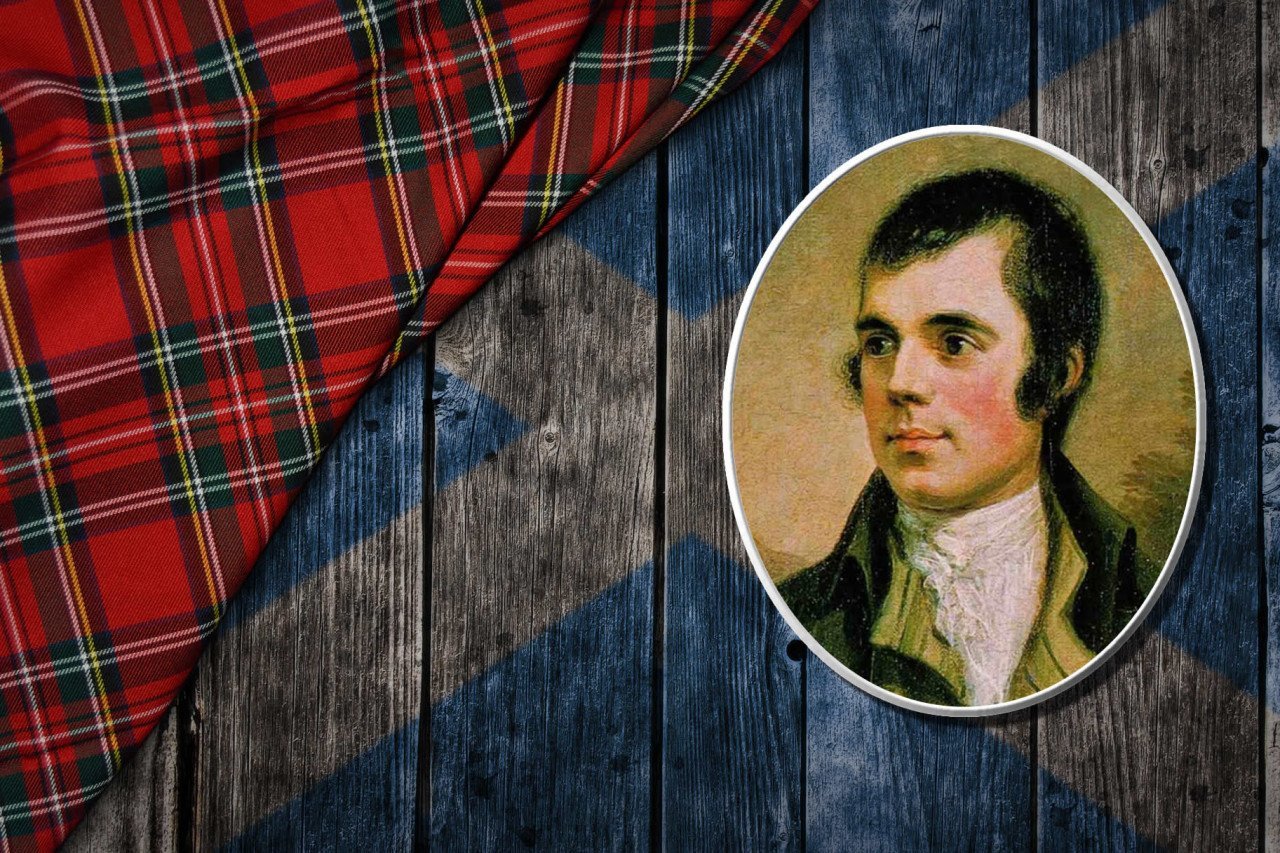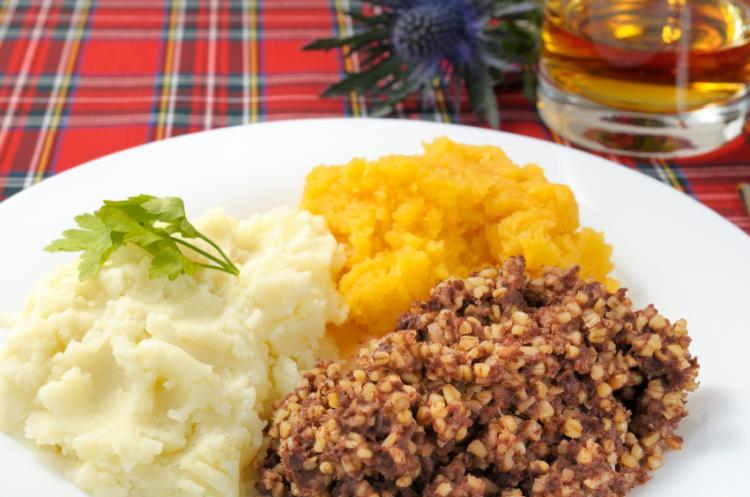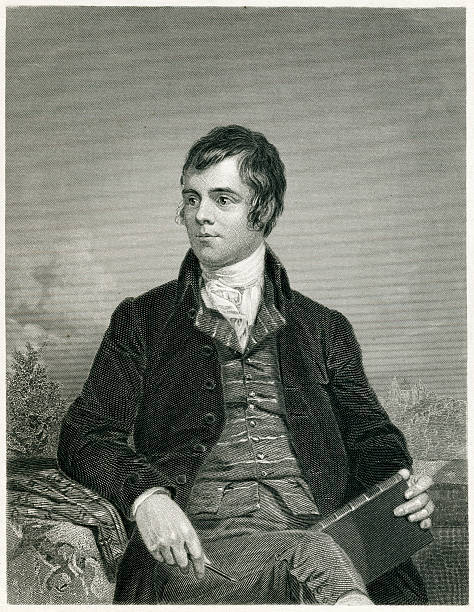
Burns Supper
A Burns supper is a celebration of the life and poetry of the poet Robert Burns (25 January 1759 – 21 July 1796), the author of many a Scots poem. The suppers are normally held on or near the poet's birthday, 25 January, known as Burns Night (Scots: Burns Nicht; Scottish Gaelic: Oidhche na Taigeise;[1] also called Robert Burns Day or Rabbie Burns Day). However, in principle, celebrations may be held at any other time of the year. Burns suppers are held all around the world.

Host's welcoming speech
The host says a few words welcoming everyone to the supper and perhaps stating the reason for it.
All the guests are seated and grace is said, usually using the Selkirk Grace, a well-known thanksgiving said before meals that uses the Scots language. Although attributed to Burns, the Selkirk Grace was already known in the 17th century as the "Galloway Grace" or the "Covenanters' Grace". It came to be called the Selkirk Grace because Burns was said to have delivered it at a dinner given by the Earl of Selkirk.
Selkirk Grace
Some hae meat an canna eat,
And some wad eat that want it;
But we hae meat, and we can eat,
And sae the Lord be thankit.[11]
Soup course
Cullen skink soup
The supper starts with the soup course. Normally a Scottish soup, such as Scotch broth, potato soup, cullen skink, or cock-a-leekie, is served.
Haggis
Piping in the haggis
Bringing in the haggis
To a Haggis. (Edinburgh Edition 1787)
Everyone stands as the haggis is brought in. Haggis is a meat dish[13] but in recent decades, a vegetarian alternative is often available.[14][15] It is usually brought in by the cook on a large dish, generally while a bagpiper leads the way to the host's table, where the haggis is laid down. "A Man's A Man for A' That", "Robbie Burns Medley" or "The Star O' Robbie Burns" might be played.[16] The host, or perhaps a guest, then recites the Address to a Haggis.
"Address to a Haggis"
Addressing the haggis
Fair fa' your honest, sonsie face,
Great chieftain o' the puddin-race!
Aboon them a' ye tak your place,
Painch, tripe, or thairm:
Weel are ye wordy o' a grace
As lang's my airm.
(fa = befall, sonsie = jolly/cheerful)
(aboon = above, a' = all)
(painch = paunch/stomach, thairm = intestine)
(wordy = worthy)
The groaning trencher there ye fill,
Your hurdies like a distant hill,
Your pin wad help to mend a mill
In time o' need,
While thro' your pores the dews distil
Like amber bead.
(hurdies = buttocks)
His knife see rustic Labour dicht,
An' cut you up wi' ready slicht,
Trenching your gushing entrails bricht,
Like ony ditch;
And then, O what a glorious sicht,
Warm-reekin, rich!
(dicht = wipe, here with the idea of sharpening)
(slicht = skill)
(reekin = steaming)
Then, horn for horn, they stretch an' strive:
Deil tak the hindmaist! on they drive,
Till a' their weel-swall'd kytes belyve,
Are bent like drums;
Then auld Guidman, maist like to rive,
"Bethankit" hums.
(deil = devil)
(swall'd = swollen, kytes = bellies, belyve = soon)
(bent like = tight as)
(auld Guidman = the man of the house, rive = tear, i.e. burst)
Is there that o're his French ragout
Or olio that wad staw a sow,
Or fricassee wad mak her spew
Wi' perfect scunner,
Looks down wi' sneering, scornfu' view
On sic a dinner?
(olio = stew, from Spanish olla/stew pot, staw = make sick)
(scunner = disgust)
Poor devil! see him ower his trash,
As feckless as a wither'd rash,
His spindle shank, a guid whip-lash,
His nieve a nit;
Thro' bloody flood or field to dash,
O how unfit!
(nieve = fist, nit = nut, i.e. tiny)
But mark the Rustic, haggis fed,
The trembling earth resounds his tread.
Clap in his wallie nieve a blade,
He'll mak it whistle;
An' legs an' arms, an' heads will sned,
Like taps o' thristle.
(wallie = mighty, nieve = fist)
(sned = cut off)
(thristle = thistle)
Ye Pow'rs wha mak mankind your care,
And dish them out their bill o' fare,
Auld Scotland wants nae skinkin ware
That jaups in luggies;
But, if ye wish her gratefu' prayer,
Gie her a haggis!
(skinkin ware = watery soup)
(jaups = slops about, luggies = two-handled continental bowls)
At the line His knife see rustic Labour dicht, the speaker normally draws and sharpens a knife. At the line An' cut you up wi' ready slicht, he plunges it into the haggis and cuts it open from end to end. When done properly, the "ceremony" is a highlight of the evening.
Main course
A cooked haggis
Haggis, neeps and tatties on a plate.
At the end of the poem, a whisky toast will be proposed to the haggis, and the company will sit down to the meal. The haggis is traditionally served with mashed potatoes (tatties) and mashed swede turnip (neeps).[12]
Other courses
A dessert course, cheese courses, coffee, etc., may also be part of the meal. The courses normally use traditional Scottish recipes. For instance, dessert may be cranachan or tipsy laird (whisky trifle), followed by oatcakes and cheese, all washed down with the "water of life" (uisge beatha), Scotch whisky.
Toasts
When the meal reaches the coffee stage, various speeches and toasts are given.
Immortal memory
The main speaker gives a speech remembering some aspect of Burns's life or poetry. It may be either light-hearted or serious and may include the recitation of a poem or a song by Burns. A toast to the Immortal Memory of Robert Burns then follows.[12]
Address to the Lassies
This was originally a short speech given by a male guest in thanks to the women who had prepared the meal. However, it is now much more wide-ranging and generally covers the male speaker's view on women. It is normally amusing and not offensive, particularly since it will be followed by a reply from the "lassies" concerned. The men drink a toast to the women's health.
Reply to the Laddies
This is occasionally (and humorously) called the "Toast to the Laddies". Like the previous toast, it is generally now quite wide-ranging. A female guest will give her views on men and reply to any specific points raised by the previous speaker. Like the previous speech, it should be amusing but not offensive. Quite often, the speakers giving this toast and the previous one will collaborate so that the two toasts complement each other.
Works by Burns
After the speeches there may be singing of songs by Burns (such as "Ae Fond Kiss", "Parcel o' Rogues", and "A Man's a Man") and more poetry (such as "To a Mouse", "To a Louse", "Tam o' Shanter", "The Twa Dogs", and "Holy Willie's Prayer").
That may be done by the individual guests or by invited experts, and it goes on for as long as the guests wish. It may include other works by poets influenced by Burns, particularly poets writing in Scots. Foreign guests may also be invited to sing or say works from their land.
Closing
Finally, the host will call on one of the guests to give the vote of thanks. Then, everyone is asked to stand, join hands, and sing "Auld Lang Syne" to bring the evening to an end.
Event Details
The Event will take place at the residence of KrokosZA and will additionally be hosted by Orosman and IngetjieZA.
Time: 6pm to 9pm or later.
Please let us know how many people will be attending and how you would like to contribute to the evening. Suggestions such as a traditional dish to share or a Burns poem reading would be greatly appreciated. Pipers, kilts and tartan attire get extra credit!

I will leave you with this..
“O were my Love yon Lilack fair”:
O were my Love yon Lilack fair,
Wi’ purple blossoms to the Spring;
And I, a bird to shelter there,
When wearied on my little wing.
How I wad mourn, when it was torn
By Autumn wild, and Winter rude!
But I was sing on wanton wing,
When youthfu’ May its bloom renew’d.
[O gin my love were yon red rose,
That grows upon the castle wa’!
And I mysel’ a drap o’ dew,
Into her bonnie breast to fa’!
Oh, there beyond expression blesst
I’d feast on beauty a’ the night;
Seal’d on her silk-saft faulds to rest,
Till fley’d awa by Phebus’ light!]